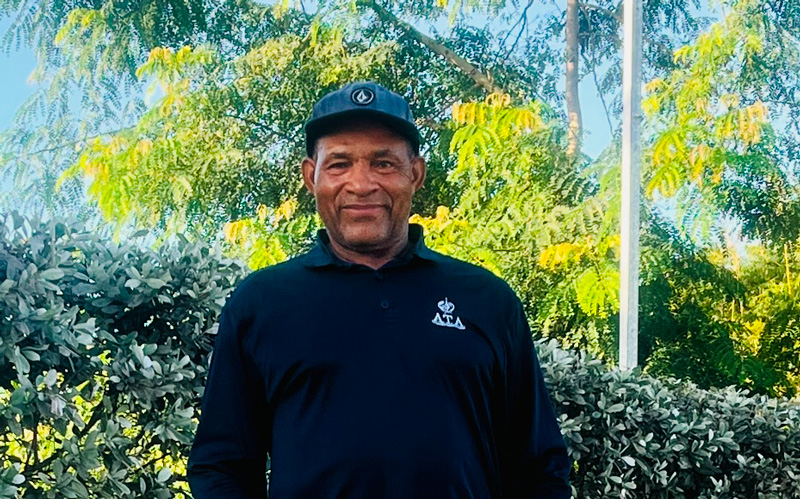Loreto is everyone’s darling.
When I told him I want to interview you, his answer was sudden and affirmative. I eagerly awaited the morning in which to navigate his life, celebrate his achievements and learn the engine of his tenacity would be my task.
And so it was.
The sunny breeze of Saturday morning predicted an authentic encounter when I saw him. There he was: concentrated, collecting debris in the back of a medium-sized warehouse.
Bibiana, let’s go! – Loreto, let’s go!
We walked with light steps so as not to miss anything. We sat on a long sofa, under a white tent and on the surface of a wooden terrace. On the horizon four beach tennis players appeared like an Olympic theater scene.
“My full name is Loreto Mejía. Well, Mejías with an eSe because it was put here in the registry.” He pauses, moved, and I watch his marble-like eyes travel through his memory. He adds precisely: “We are 16 siblings, between the two of us. I have 8 from my mother, 8 from my father.”
Loreto Mejía with an eSe – his given name in his adopted Puerto Rico – was born in the Dominican Republic on December 10. He is a Sagittarius and always had the sea as a reference in the province of Samaná.
He is a tall and corpulent man. He speaks with his hands, which have a rough architecture, bathed in tenacity, in polka dots of sun – and he tells from the heart:
“My life is work and doing it well. Since I was seven years old I started working on coconut farms and with cattle.” He was great at math and skipped grades until he could. As a teenager he supervised a farm in Miche, a town where he emigrated to financially support his family. Honoring the footsteps of his mother Elena was his best pedagogy.
“Mom always made sure that we all had food on the table.” He emulated her by working tireless days, and he made his way both on land and at sea. But the need to survive, to escape the poor conditions on the sister island of the Antilles, drove him to bravely cross the vast ocean by boat in search of opportunities.
Loreto says that the first trip to Puerto Rico was disastrous. Like so many other Dominican brothers and sisters, he too fell prey to deception, human trafficking, and human beings of a scum race.
But the second time the nautical journey was successful, thanks to a friend who had been “my competition in conquering women,” but whose solidarity for collective progress overcame any difference. That solidarity marked his evolution on the Puerto Rican island.
In Puerto Rico, Loreto worked in the countryside in Las Marías, traveled through several city towns working in the security industry at night, and as a gardener during the day. Likewise, his skills as a proactive man between jobs, turned him into a “do-it-all” and he was a maintenance manager in several family businesses.
But after the pandemic, and so much running, he anchors himself in the Riviera sports community, between Guaynabo-Bayamón, where he is a maintenance manager. Where all lovers of racket and ball sports greet Querendón, the Guardian of the courts and their green mountain areas.
In his career of tireless work, Loreto also lived a brief stay in Pennsylvania. However, he prefers to forget the bone-cutting cold. Now he visits in better weather seasons, as long as he has fulfilled his work obligations.
In the United States he has grandchildren from his daughter Lorena and his son Lorey. But it is in his Puerto Rico where he is the owner of a house acquired with hard work and honest sweat. The tenacity of his mother, faith in God, and the knowledge that “they always accompany me” is undoubtedly his driving force.
I hear it and I want to keep hearing it.
But it is time to work and continue pruning the silver mangroves that shelter the cement stands that ‘seem to smile’ at those of us who play on urban sand courts. We thank the gathering with a full look.
We thank together the now, the sun of the Saturday morning, and we seal the conversation with a tight hug.
Today, as I write, I celebrate in words, a man genuinely happy with his truth.



